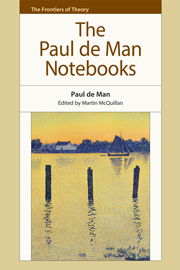Book contents
- Frontmatter
- Contents
- Series Editor's Preface
- Acknowledgements
- Dedication
- Introduction: ‘The Unimaginable Touch of Time’: The Public and Private in the Notebooks of Paul de Man
- PART I Texts
- PART II Translations
- PART III Teaching
- PART IV Research
- Appendix. The Notebooks of Paul de Man 1963–83
- Bibliography
- Index of Names
Introduction: ‘The Unimaginable Touch of Time’: The Public and Private in the Notebooks of Paul de Man
Published online by Cambridge University Press: 05 December 2014
- Frontmatter
- Contents
- Series Editor's Preface
- Acknowledgements
- Dedication
- Introduction: ‘The Unimaginable Touch of Time’: The Public and Private in the Notebooks of Paul de Man
- PART I Texts
- PART II Translations
- PART III Teaching
- PART IV Research
- Appendix. The Notebooks of Paul de Man 1963–83
- Bibliography
- Index of Names
Summary
Archive Labour
Truth fails not; but her outward forms that bear
The longest date do melt like frosty rime,
That in the morning whitened hill and plain
And is no more; drop like the tower sublime
Of yesterday, which royally did wear
His crown of weeds, but could not even sustain
Some casual shout that broke the silent air,
Or the unimaginable touch of Time.
(William Wordsworth, ‘Mutability’)The Paul de Man papers are held in the Critical Theory Archive, on the fifth floor of the Langdon Library, in the Department of Special Collections and Archives at the University of California Irvine (UCI). The papers cover a wide range of material, including texts from de Man's time as a graduate student at Harvard in the late 1950s, manuscripts of his published writing, manuscripts of essays that have since his death formed the content for published books edited by others, correspondence, and files related to his many years as a professor and teacher of comparative literature. Included in these files is a run of notebooks from 1963 to 1983 related to de Man's doctoral seminar in each of those years, from a seminar on Yeats given in Zurich in the June and July of 1963 to de Man's last course, given in 1983, entitled ‘Theory of Rhetoric in the Eighteenth and Twentieth Centuries’. There are notebooks on Romanticism, Rousseau, Mallarmé, Baudelaire, Rilke, Stefan George, the eighteenth-century novel, Keats, Kleist, André Gide, Marcel Proust and Henry James, Derrida, Nietzsche, Hegel, Descartes, Pascal, Kant and Schiller.
Information
- Type
- Chapter
- Information
- The Paul de Man Notebooks , pp. 1 - 20Publisher: Edinburgh University PressPrint publication year: 2014
